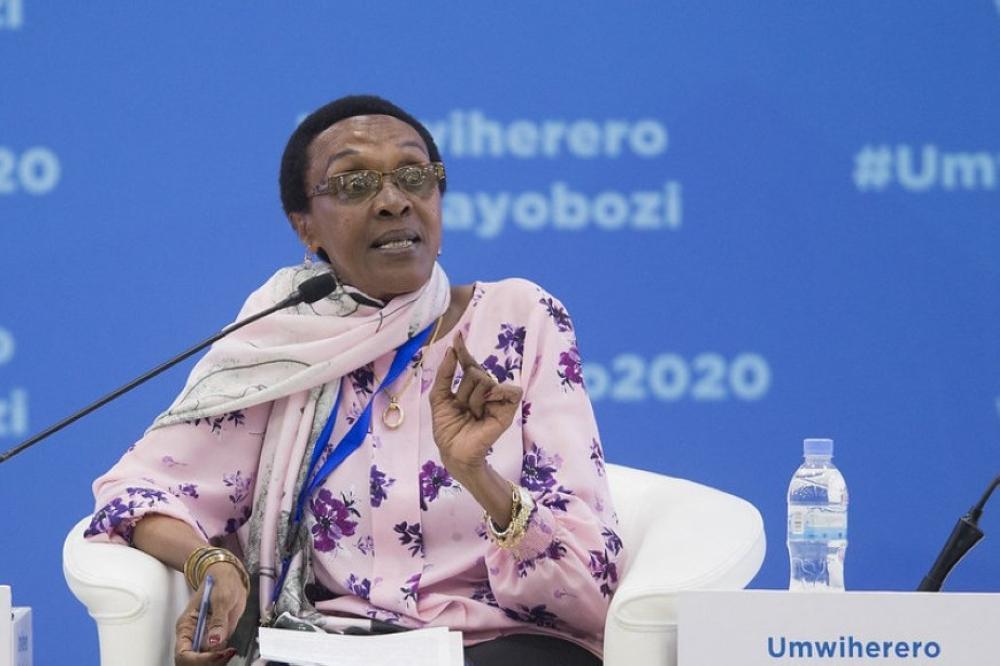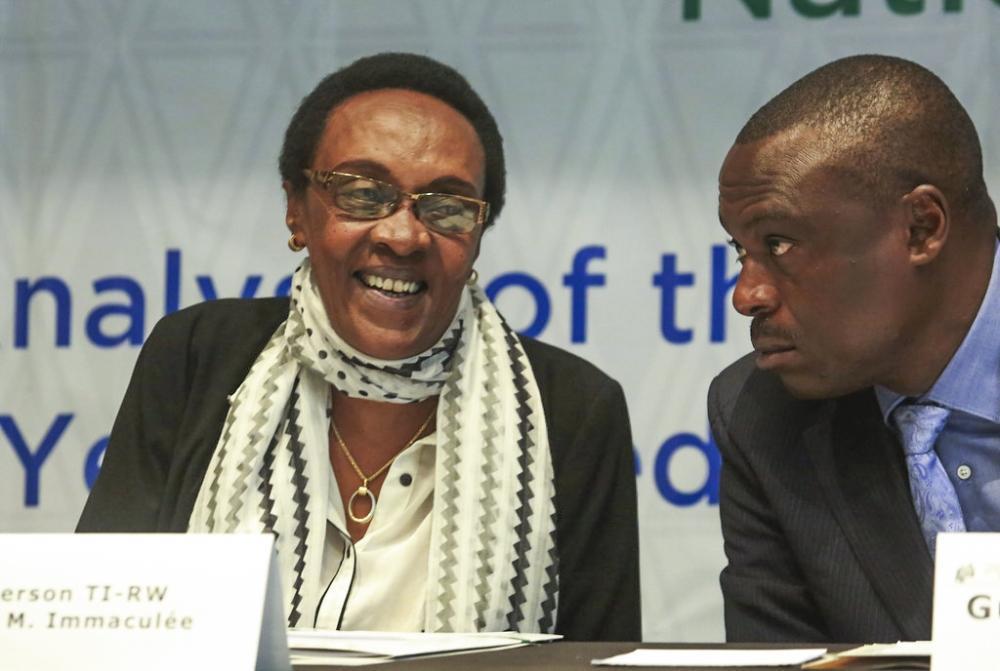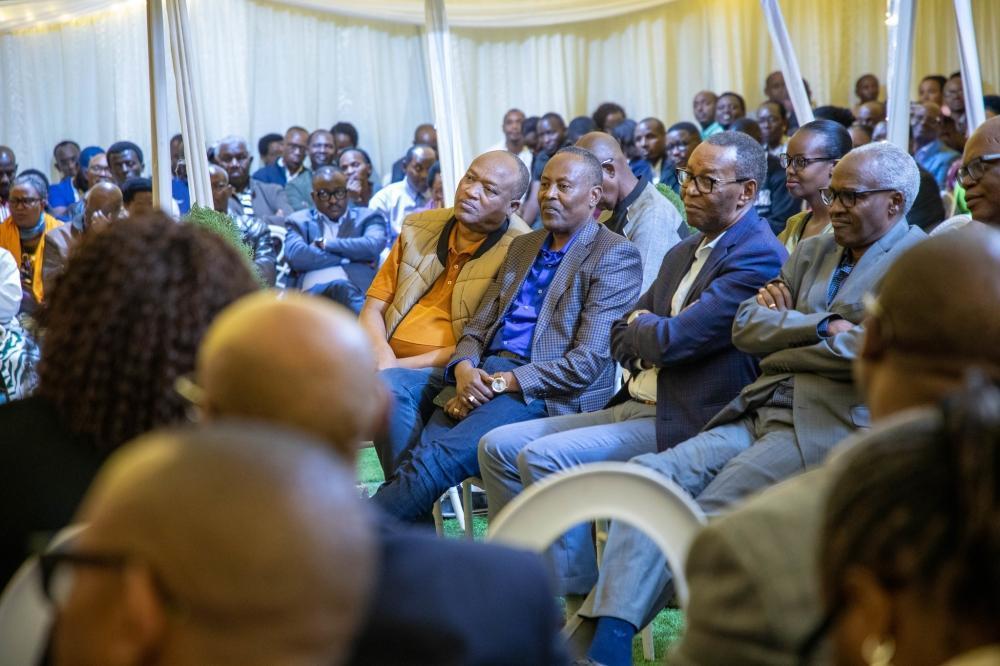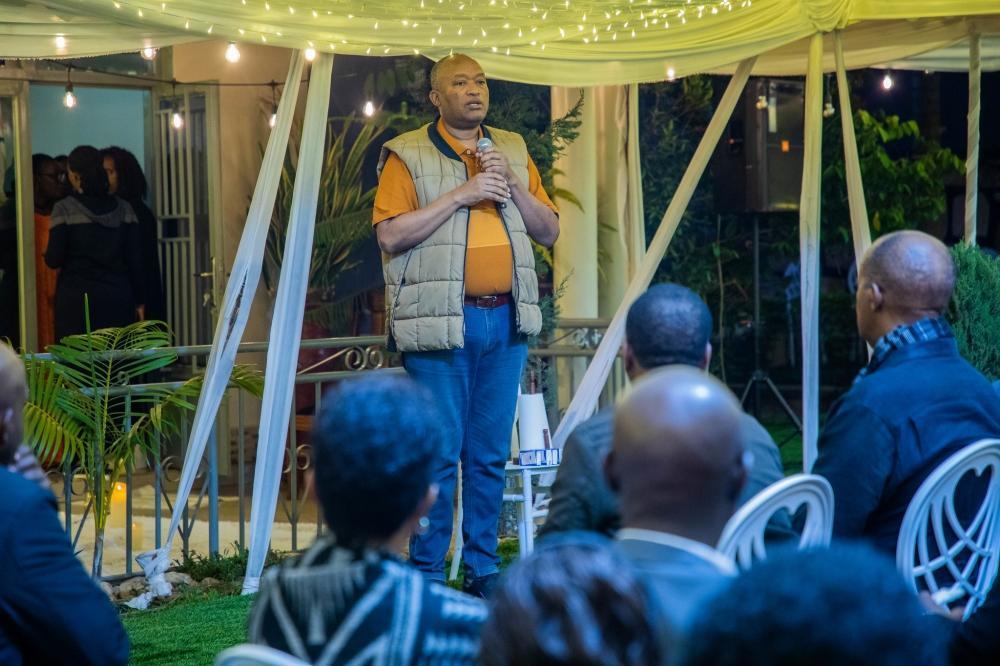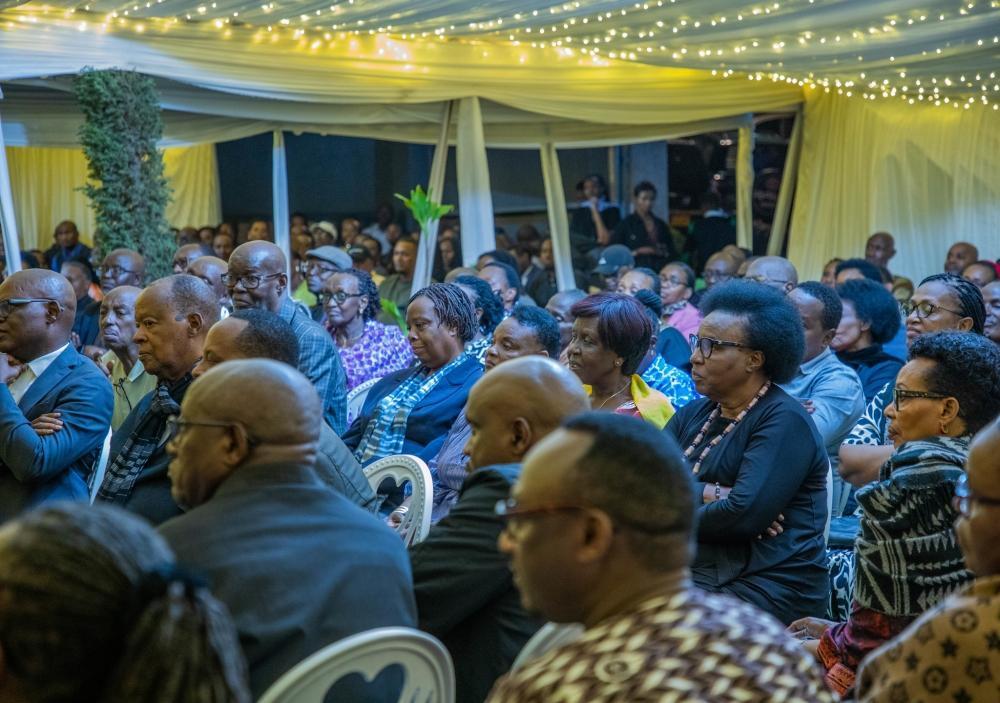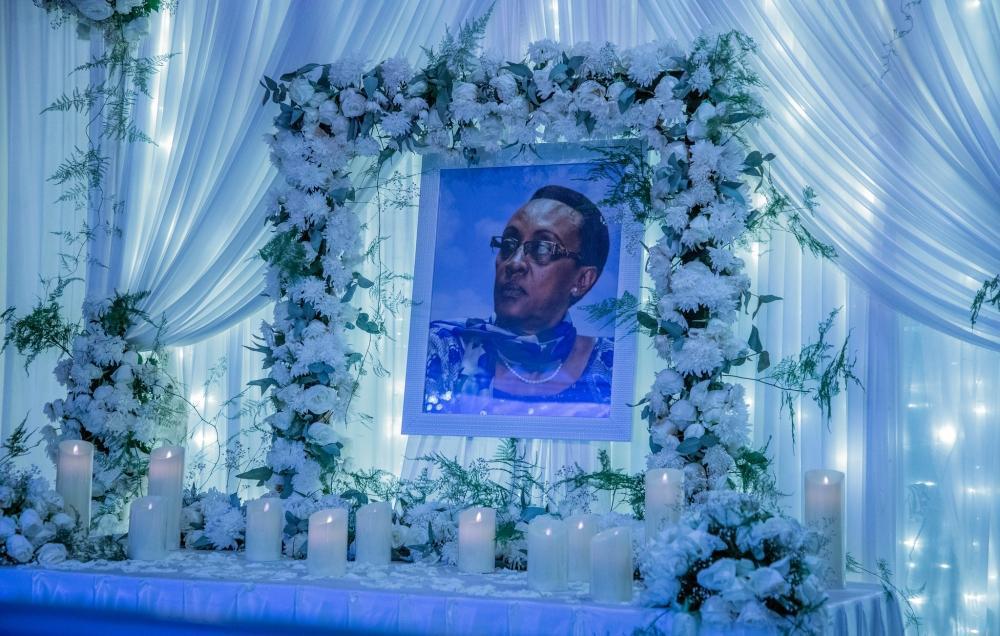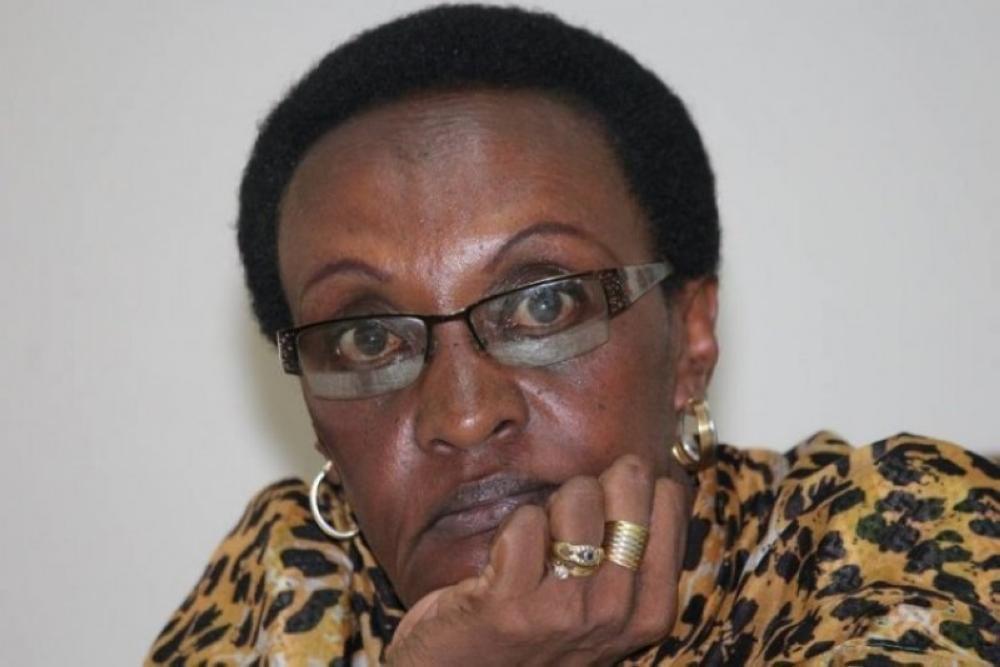Africa-Press – Rwanda. Today , October 16, Rwanda will lay to rest one of its most fearless voices. Marie Immaculée Ingabire’s legacy spans media, women’s rights, integrity, and an unwavering fight against injustice.
She asked not to be mourned in sorrow but remembered through pride and action, a final gesture consistent with a life devoted to courage and service.
Her request at the vigil was simple and deeply symbolic. She wanted only patriotic and celebratory Rwandan songs, the same melodies that inspired resilience during the country’s rebirth after the 1994 Genocide against the Tutsi.
Ingabire interacts with Clement Musangabatware, former Deputy Ombudsman in charge of preventing and fighting corruption, during a meeting. Photo by Sam Ngendahimana
She insisted there was no need for mourning songs because, as she put it, she had “served her time.” And instead of flower wreaths, she asked that well-wishers channel those funds into a charity account that would continue to support the many dependents she quietly helped. Even in her farewell, she turned mourning into purpose.
The echo of a life in media and advocacy
From her earliest days in post-genocide Rwanda, Marie Immaculée Ingabire charted a path few dared to follow. She saw the media not just as a tool for communication but as a weapon for truth, accountability, and transformation.
Long before media reform became a national conversation, she was among those who believed that a free and responsible press was a cornerstone of democracy.
In her final interview with The New Times, earlier this year in February, she spoke with characteristic candour about her journey. She recalled moments when standing for truth came at a personal cost, times when backlash and threats were frequent companions.
Yet she remained unmoved. Her work helped define the early character of Rwanda’s media fraternity, mentoring young journalists and urging them never to trade integrity for convenience.
The media community on Monday honoured her legacy, with some of her colleagues and comrades describing her as a woman who treated journalism as a calling rather than a career.
As Scovia Mutesi, chairperson Rwanda Media Commission (RMC), put it, to the media fraternity, Ingabire was not only a mentor but a mirror, reminding everyone that courage and accountability were inseparable.
“Many of us can aspire to follow in her footsteps but we cannot achieve the same feats as she did. We can only try to emulate her,” the head of the media self-regulatory body said.
Ingabire often urged reporters to remember that journalism was about people first, and that truth must never be diluted to please power.
Her influence extended beyond the newsroom. Through her leadership at Transparency International Rwanda and her involvement in civic education, she continued to push for ethical standards that built trust between citizens and institutions.
For Ingabire, the media’s moral obligation was clear: to empower society through honesty, empathy, and fairness. Due to that connection, she served on several media bodies over the years.
Fighting for women’s rights and equality
Speaking truth to power was part of her DNA. In the same interview, she reflected on how the fight for women’s rights could not be separated from the broader fight for justice. She challenged both men and women to dismantle stereotypes that limited women’s potential, insisting that progress could only be achieved through shared responsibility.
Her close friend of three decades, Dr Rose Mukankomeje, recalled a life lived with conviction. “Ingabire was my real and good friend. We met for the first time in 1995 after the Genocide against the Tutsi. We stayed together until her death last week,” Mukankomeje told The New Times.
“She was a committed person who loved her country, loyal to her family and friends. She was wise, compassionate, and unrelenting in the fight against injustice, discrimination, and corruption. Her legacy is huge for all of us Rwandans, especially women and youth,” she added, wishing her an eternal rest.
Mukankomeje described her as the kind of friend who never allowed comfort to dilute conviction. Whether in boardrooms, conferences, or community meetings, Ingabire demanded accountability and fairness.
She mentored generations of young women who found in her a symbol of resilience, reminding them that empowerment was not given but earned through persistence and purpose.
Boldness, selflessness, and principled
Ingabire’s life was defined by boldness, by the refusal to remain silent when others looked away. She believed that public service meant confronting wrongdoing, even when doing so invited criticism. Her voice often made people uncomfortable, but it was a discomfort rooted in truth.
The Night of Vigil was attended by many people to honour Marie Immaculée Ingabire who passed away on Thursday, October 9. Photo by Craish BAHIZI
Her selflessness was equally profound. Her choice to replace flowers with charitable contributions spoke volumes about her priorities.
She preferred to convert gestures of sympathy into opportunities for service. She lived modestly but gave generously, often supporting families and students without ever mentioning it publicly. Those who knew her best said she found meaning not in recognition but in responsibility.
Integrity as a way of life
Integrity was the thread running through every chapter of her life. Whether confronting corruption, gender bias, or social injustice, Ingabire stood firm. Her leadership at Transparency International Rwanda was not merely administrative but moral.
She treated integrity as a daily discipline, not a slogan. She demanded transparency from others because she lived it herself.
Ambassador Charles Murigande, who knew her for over three decades, described her as the embodiment of RPF values. “I’ve known Madam Marie Immaculée Ingabire for the last 31 years,” he said.
“To me, she was a model RPF cadre who faithfully lived the ideals and beliefs of the party. One of its objectives was to fight all forms of injustice in Rwandan society, and Madam Ingabire wholeheartedly committed her life to that,” said Dr. Murigande, who first met her in exile in Burundi.
“She fearlessly spoke up for those who could not speak for themselves, defending the rights of the poor and destitute without distinction.”
He remembered her practice of “constructive criticism,” one of the RPF’s foundational methods.
“She lived that principle without fear or favour, speaking truth in love and humility. She was a true patriot with great love and devotion to Rwanda, always ready to put her life on the line for her country,” Amb. Murigande said.
“She was loyal and dependable to her country, to the RPF, to her family and friends. She was a woman of integrity who hated corruption in all its forms and inexhaustibly fought against it, especially during her tour of duty as President of Transparency International Rwanda,” he added.
Her moral clarity and courage often placed her in the middle of national debates. Yet, those who disagreed with her respected her honesty, because she never sought to humiliate opponents, only to awaken conscience.
A fellow combatant for truth
Tom Ndahiro, who worked alongside Ingabire for decades — first as a journalist and later as a fellow activist — remembers her as a relentless and determined fighter for justice.
“She had the courage to confront the ills in society. She fought corruption with dedication, and she was patriotic and loving,” he said.
Researcher Tom Ndahiro speaks during the night of vigil on Tuesday.
“When it came to fighting injustice or corruption, she did it as if it was something that personally affected her. She could not tolerate injustice wherever or whenever it appeared, and that became the impetus behind everything she did, both as a journalist and later in civil society,” Ndahiro said.
WATCH VIDEO: Marie-Immaculée Ingabire: Is dignity worth sacrificing for money?
He described her as a “fellow combatant” in the ongoing battle against genocide denial and historical distortion. “She fought genocide and genocide deniers, which is what I have been doing too. I called her a fellow combatant,” he added.
Ndahiro describes how in the early years of practice, during the RPF liberation struggle and the years that followed liberation, Ingabire focused on delivering despite the limited resources the country had.
“We had no means, but we had commitment. When you are dedicated to doing your work as a journalist, you can’t fail. It can be difficult, but difficulty can be overcome,” he said.
Ndahiro’s words capture the shared conviction that drove their work; the belief that truth and integrity were worth every sacrifice.
Together, they represented a generation of journalists who rebuilt Rwanda’s moral compass through storytelling and advocacy.
Mourners listen to Charles Murigande while sharing his testimony during the night of vigil on Tuesday. Photo by Craish BAHIZI
A generational legacy
For many Rwandans, Ingabire’s story is not just inspiration; it is instruction. To young women, she proved that leadership demands courage and compassion in equal measure.
To journalists, she left a blueprint for ethical reporting grounded in the pursuit of truth. To all citizens, she showed that justice is not an abstract principle but a lived commitment.
She was known to say that advocacy is not a career but a lifelong obligation. In her final interview, she reminded readers that progress is never permanent; it must be protected by each generation. Those words now read like a challenge to continue where she left off.
Her life also illustrates how patriotism and criticism can coexist. She loved Rwanda deeply and served it faithfully, yet she never hesitated to question what could be done better. In doing so, she embodied the kind of citizen every democracy needs; loyal, engaged, and unafraid.
A celebration, not mourning
Her decision to fill her vigil with celebratory songs instead of dirges reflected her essence. She believed that a life of purpose should end with gratitude, not grief.
Those who attended and saw the likes of Ibrahim Cyusa and Inyamibwa Troupe said the atmosphere was uplifting, filled with national pride and quiet admiration, unlike most vigils characterised by mourning.
Marie Immaculée Ingabire , the former chairperson of Transparency International Rwanda Chapter passed away on Thursday, October 9. She will be laid to rest on Thursday, October 16. Photo by Craish BAHIZI
Her absence was felt, but so was her enduring presence through the principles she championed.
The charity initiative she proposed is expected to continue supporting vulnerable families, particularly children and widows she had mentored or sponsored. It is a fitting continuation of a life spent giving, a legacy of compassion transformed into action.
The voices she leaves behind
Across generations, those who worked with her recall her laughter, her firmness, and her uncompromising ethics. She was as quick to correct as she was to encourage, as warm as she was principled. To her, mentorship meant more than guidance; it was about building others to surpass her.
WATCH: Marie Immaculée Ingabire: Empowering Women, promoting positive feminism
Even those who clashed with her admired her resolve. She was respected for her consistency, and she believed the same things in public and in private. Her integrity was not seasonal, and her advocacy did not waver with convenience.
A nation’s debt
Marie Immaculée Ingabire will be laid to rest on Thursday, October 16. Courtesy
Rwanda owes much to Marie Immaculée Ingabire’s unyielding commitment to truth and justice. The progress in media freedom, gender inclusion, and anti-corruption work bears her imprint.
She leaves behind stronger institutions, a more confident generation of women, and a civic culture that values integrity as patriotism.
She showed that fighting injustice is not the task of the powerful alone but the duty of every citizen. Her life remains a reminder that courage can be gentle, that conviction can coexist with compassion, and that service is the truest form of leadership.
The song to sing
As Rwandans gather to honour her, her message endures: speak truth, live with integrity, and serve with compassion. Her life teaches that patriotism is measured not by comfort or titles but by the courage to confront injustice and the humility to uplift others.
Ingabire lived with boldness, spoke with conviction, and gave with grace. Her voice may have fallen silent, but her message continues to resonate wherever justice and integrity matter most.
For More News And Analysis About Rwanda Follow Africa-Press

